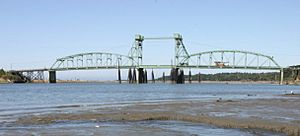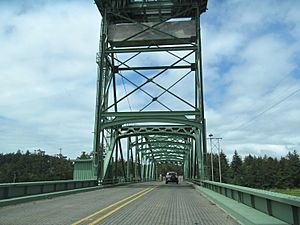Bullards Bridge facts for kids
Quick facts for kids Bullards Bridge |
|
|---|---|
 |
|
| Coordinates | 43°08′50″N 124°23′44″W / 43.1471°N 124.3955°W |
| Carries | |
| Crosses | Coquille River |
| Locale | Bandon, Oregon, U.S. |
| Maintained by | ODOT |
| Preceded by | Ferry |
| Characteristics | |
| Design | Vertical-lift bridge with flanking camelback truss spans |
| Material | Steel |
| Total length | 702 ft (214 m) |
| Width | 26 ft (7.9 m) |
| Clearance above | Approx. 17 feet (5.2 m) (on the roadway deck) |
| Clearance below | 81 feet (25 m) fully open; 31 feet (9.4 m) closed |
| History | |
| Construction begin | 1952 |
| Opened | 1954 |
| Statistics | |
| Daily traffic | 8,282 (2007) |
The Bullards Bridge is a special kind of bridge called a vertical-lift bridge. It crosses the Coquille River in Oregon, near the town of Bandon. This bridge is an important part of U.S. Route 101, which is a major highway along the coast. It was finished in 1954.
Contents
What is the Bullards Bridge?
The Bullards Bridge is unique because its middle section can lift straight up. This allows tall boats to pass underneath. It's one of only two bridges like this on the Oregon Coast Highway. The parts of the bridge next to the lifting section are called "camelback truss" spans. These look like humps, similar to a camel's back. The bridge is located right next to Bullards Beach State Park.
Why Was the Bridge Built?
Before the Bullards Bridge was built, people used a ferry service to cross the Coquille River. This ferry was called Bullards Ferry. The bridge was built to replace this ferry, making it easier and faster for cars to cross. The name "Bullards" comes from the Bullard family, who were some of the first people to settle in this area. Construction on the bridge started in 1952, and it was officially opened on September 20, 1954.
Keeping the Bridge Safe
When the bridge was first built, some very tall trucks had trouble fitting underneath. They would sometimes hit the top of the bridge! To fix this, workers made changes in 2006 and 2007. They moved some parts of the bridge to make it about 2 feet taller for vehicles. This helped prevent accidents with tall trucks.
The bridge needs regular check-ups and maintenance to stay in good shape. For example, in 2009, the Oregon Department of Transportation planned a big repair project. The lifting part of the bridge isn't used very often anymore for boats. In fact, by 2009, it hadn't been lifted for marine traffic in seven years. It is only lifted once a year for testing and maintenance.
Bridge Facts and Figures
The Bullards Bridge is about 702 ft (214 m) long and 26 ft (7.9 m) wide. Many cars use the bridge every day. In 2004, about 6,000 vehicles crossed it daily. By 2007, that number had grown to about 8,300 vehicles each day.
 | Aurelia Browder |
 | Nannie Helen Burroughs |
 | Michelle Alexander |


